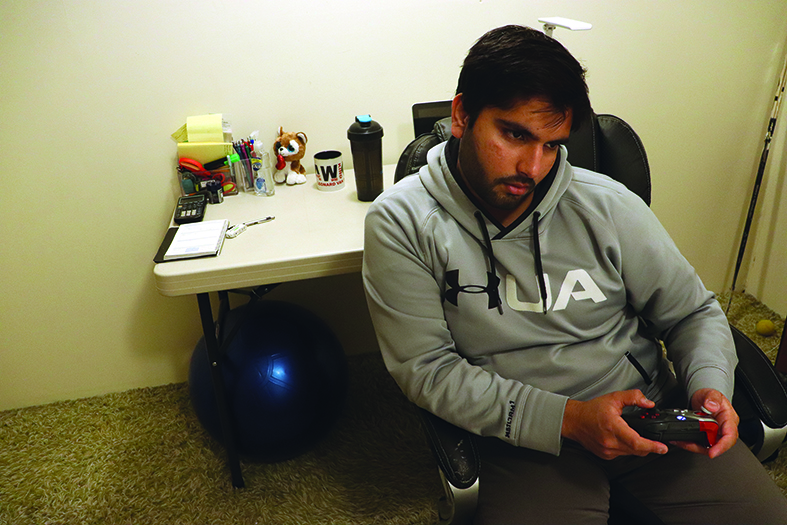Jinay Patel takes a break from his studies to play a little bit of Xbox on Nov. 8, 20.
Lethbridge College is introducing a student video game tournament.
E-sports is the competitive playing of video games, a sport that has grown in recent years and post-secondary institutions are taking notice.
Any student at Lethbridge College can compete in the Nintendo Switch Smash Bros. tournament scheduled for Nov. 21.
Todd Caughlin Lethbridge College manager of athletics says the school has been looking into the world of e-sports for quite some time.
“This has been something that’s been talked about for probably three to four years now, but it just never really got off the ground or never really gained any momentum.”
This changed when COVID-19 hit college sports activities hard, leaving e-sports as an easy online way to have events.
“COVID-19 was one thing that induced it, because obviously many people are staying at home and there are a lot of gamers out there, so it was an opportunity for the college to do something different,” says Caughlin.
Caughlin is also excited with e-sports as a way of connecting with all students, not just athletes.
“One of the reasons I like it, is because it’s for the entire college. When I first started at Lethbridge College, I helped coin the phrase of the hashtag ‘we’re all Kodiaks’, because you don’t have to have a Jersey on to be a Kodiak and now with e-sports that has come to fruition and I love it.”
Lethbridge College and the Alberta Colleges Athletic Association (ACAC) partnered with the Alberta E-Sports Association (AESA) to help set up and promote the event.
The AESA is a non-profit organization with the goal of growing e-sports in Alberta.
Brad Jones, the AESA co-founder has been thrilled with the partnership, saying it’s a good way to connect with students.
“Schools are looking for something to engage with their students and ways that they can continue the education process in a more dynamic way especially online, which e-sports is obviously a very nice fit and working with ACAC has been a dream.”
The AESA had to adapt how they were running events due to the pandemic, but in the end COVID helped them connect with even more communities.
“When COVID hit, it sucker punched a lot of the events that were going on in-person. We were just getting to the point where events had 500 or more people in person, but of course that was suddenly shut down. We started converting online and were approached by some of our existing partners to make something happen and we got engaged with other communities,” says Jones.
It also encourages Jones to see e-sports growing throughout Alberta and that post-secondary institutions are taking notice and wanting to take part.
“It’s been fantastic honestly; it’s been so heartwarming. For how long we’ve been doing this, just as kids in the community and all the guys in their parents’ basement, it’s really nice to see that we have a push for e-sports on a global scale.”
E-sports has become a staple at larger institutions in the United States as well as certain schools in Canada, but has yet to really take off across Canada.
Both Caughlin and Jones believe e-sports will continue to grow in post-secondary institutions and that schools may soon have their own competitive e-sports teams and leagues.
“It’s kind of a no-brainer, if you’re looking at the world scale, there’s already examples out there of so many places that have existing teams that are incredibly successful. We’re seeing a lot of schools wanting to get engaged and students wanting to get engaged, so it’s really just a matter of putting it all together and finding the right people at the right time. I think that there’s no stopping it honestly,” says Jones.
Caughlin hopes this event will get a lot of traction and that they will be able to host similar tournaments throughout the year.
“We’re working closely with the LCSA and with the DCM program to try and promote these events and I’m hoping that this thing just goes off on the 21.”



